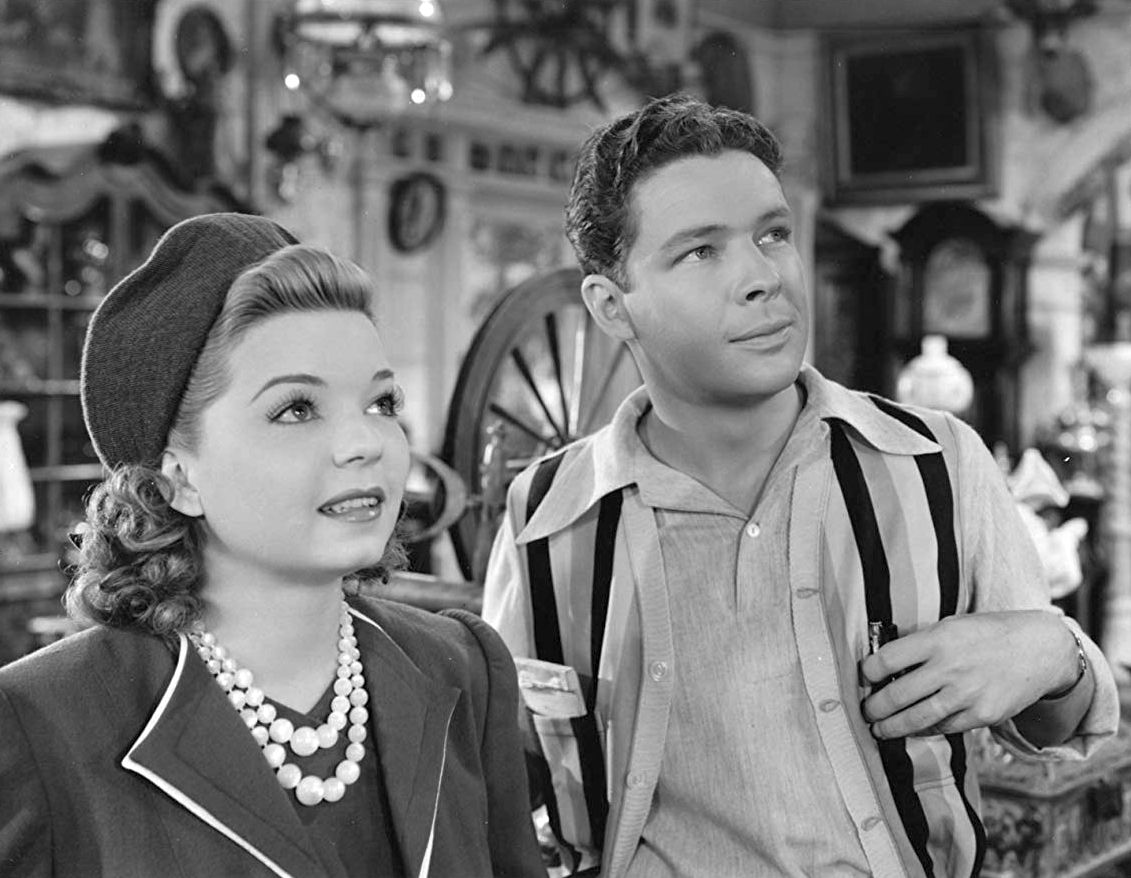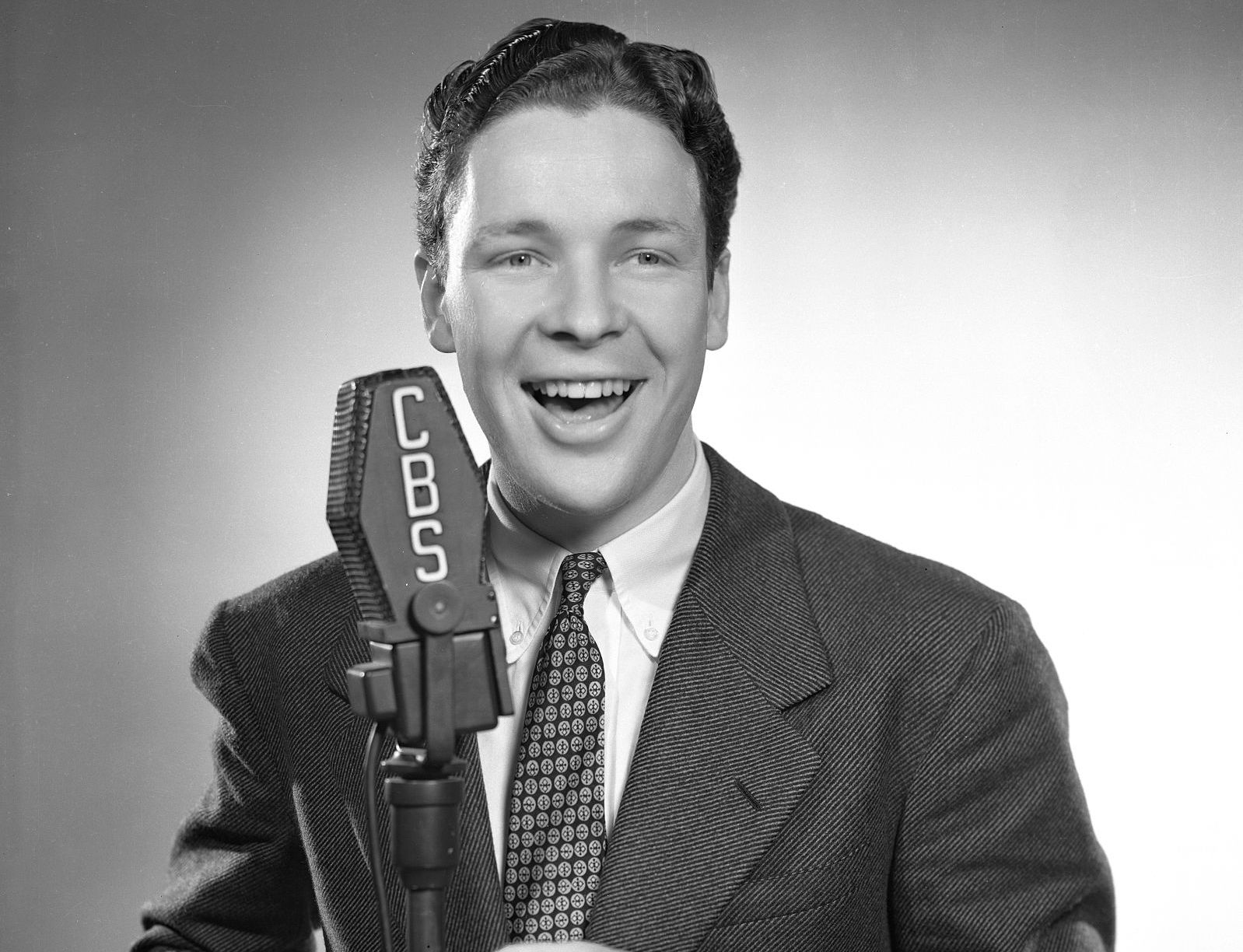Happy Birthday, Kenny Baker!
Posted by Ivan G. Shreve, Jr. on Sep 30th 2019
From 1935 to 1939, Kenneth Laurence Baker—born in Monrovia, California on this date in 1912—was welcomed into millions of homes as the popular tenor vocalist on radio’s The Jack Benny Program. Kenny was more than just a singer, however; he was pressed into showing off his comedic chops as a member of Benny’s “gang,” playing a slightly zany and naïve young man who drove his boss to distraction. Baker wasn’t the first to perform this function (Frank Parker held the job previously) and he certainly wouldn’t be the last. Upon Kenny’s departure in 1939, Dennis Day would replace him as both vocalist and male “Gracie Allen.” But while Dennis became the yardstick by which that character would be measured, Kenny had quickly grown tired of his gig as stooge. In later years, he remarked on his Benny show exit: “It wasn’t easy walking away from $150,000 a year…but I realized if I didn’t kill the jerk character it would kill me.”
Educated in several California schools, Kenny Baker’s experience as a boy soprano in a church choir lit the fire of inspiration underneath him to pursue a musical career. Before that dream could be fulfilled, however, he was often called upon to work in his father’s furniture store. Baker also toiled as a day laborer to earn money for his musical education at Long Beach City College. While at college, Kenny won a radio contest, and his reward was a singing engagement at Los Angeles’ famed Cocoanut Grove. Baker made his radio debut practically as an unknown—Jack Benny was auditioning for a replacement for Frank Parker and Kenny’s successful tryout found him debuting on the show on November 3, 1935.
Kenny Baker’s weekly exposure on The Jack Benny Program was a boost to his movie career as well. He was frequently called upon to provide a singing voice for characters in animated cartoons and, after small roles in films like George White’s 1935 Scandals and Metropolitan (both 1935), he gravitated to credited parts in King of Burlesque (1936), Turn Off the Moon (1937), Mr. Dodd Takes the Air (1937), and Radio City Revels (1938). Baker was under contract to movie mogul Samuel Goldwyn, which explains why he was cast in the all-star The Goldwyn Follies in 1938. While still employed with Benny, Kenny appeared in what perhaps is his best-known motion picture, a silver screen adaptation of the Gilbert and Sullivan operetta The Mikado (1939). Baker’s rendition of “A Wand’ring Minstrel I” was so well-received that it became his signature song.

Kenny Baker may have said goodbye to Jack and the gang at the end of the 1938-39 season (he later made two guest appearances on the program), but it wasn’t as if he was desperate for work. Baker became the resident vocalist on The Texaco Star Theatre in the fall of 1938 (he worked this gig on Wednesday nights, so it didn’t interfere with his Benny appearances). He continued in this capacity until the fall of 1940, when the program became the showcase for Fred Allen’s comedy. Kenny stayed with Fred for two additional years; Allen’s show was shortened to a half-hour in the fall of 1942 and the decision was made to dispense with Kenny’s services.
Kenny Baker’s movie career continued to chug along. He had the thankless role of straight man to the Marx Brothers in At the Circus (1939), and his additional motion picture appearances include Hit Parade of 1941 (1940), Silver Skates (1943), Stage Door Canteen (1943), and Doughboys in Ireland (1943). Baker took a hiatus from films in 1943 to co-star opposite Mary Martin in the Broadway smash One Touch of Venus (directed by Elia Kazan!) and when he finished that nearly two-year run it was back before the camera for The Harvey Girls (1946) and Calendar Girl (1947), his final film.
Kenny Baker may not have maintained the radio fame that he garnered working with Jack Benny or Fred Allen, but he appeared on several shows throughout the 1940s, including the self-titled The Kenny Baker Show and Sincerely, Kenny Baker. He had a brief stint as the vocalist on Blue Ribbon Town after Groucho Marx left in mid-June of 1944. (The show’s creative minds were convinced he would be more entertaining than Groucho.) Baker worked a little longer on the daytime variety series Glamour Manor (from 1946 to 1947). His other radio credits include Command Performance, Family Theatre, Mail Call, The Pause That Refreshes, The Radio Hall of Fame, and The Railroad Hour.
Kenny Baker’s show business career started to winnow itself by the 1950s. He has a credit on the IMDb for an appearance on TV’s Musical Comedy Time in 1951, but he was ready to retire and did so. He devoted his time to wife Geraldyne (his high school sweetheart, whom he married in 1933) and their three children. He also became a practicing Christian Scientist and motivational speaker and recorded several gospel hymn albums to benefit his church. Kenny Baker would leave this world for a better one in 1985 at the age of 72.

In honor of Kenny Baker’s natal anniversary, Radio Spirits invites you to check out the role that made him famous in the Jack Benny collection The Great Outdoors and our fantabulous compendium Jack Benny vs. Fred Allen: The Feud. But that’s just the singing-and-joshing Kenny: you’ll find a more dramatic Baker in our Family Theatre set Every Home (“Wanted: One Baby”) and an additional Family Theatre broadcast (“Blessed are They”) in our Yuletide collection Great Radio Christmas. Happy Birthday, Kenny!

